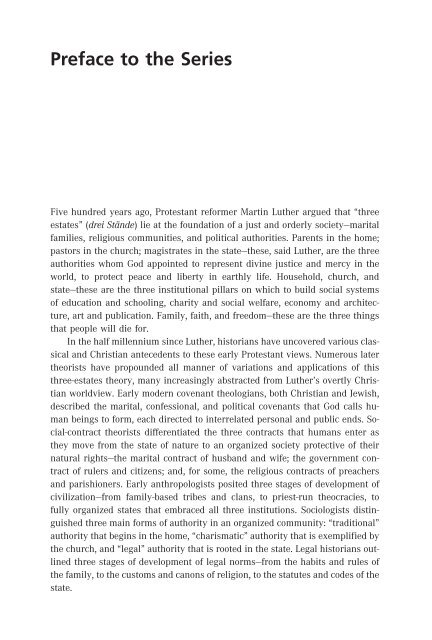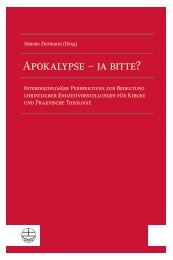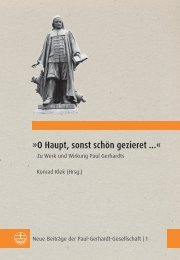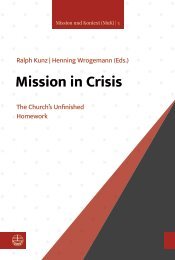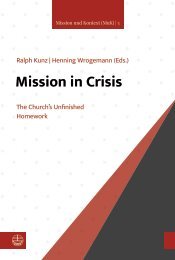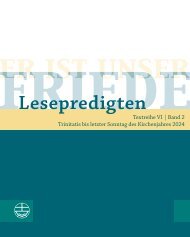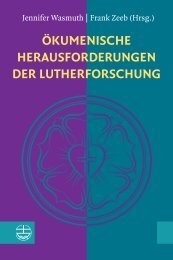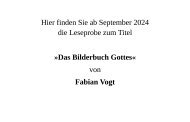Piet Naudé | Michael Welker | John Witte, Jr. (Eds.): The Impact of Political Economy (Leseprobe)
In our late modern pluralistic societies, there are tensions and complementarities between a plurality of individual and social claims and activities to shape societal life and a constructive pluralism of what is known as social systems. The latter provide normative codes and powers emanating from the areas of law, religion, the family, the market, the media, education, academic research, health care, defense and politics. A better understanding and steering of this complex division of powers is crucial for the common good and for freedom and peace. In this volume, a multi-disciplinary team of experts from Germany, Italy, Australia, the UK, the USA, and South Africa bring their conceptual, empirical and historical insights to bear in three broad sections: »The moral dimension of social systems«; »The interaction of religion, law and education with political systems«; and »The moral (mal)-formation evident in case studies on the global financial crisis and social media«.
In our late modern pluralistic societies, there are tensions and complementarities between a plurality of individual and social claims and activities to shape societal life and a constructive pluralism of what is known as social systems. The latter provide normative codes and powers emanating from the areas of law, religion, the family, the market, the media, education, academic research, health care, defense and politics. A better understanding and steering of this complex division of powers is crucial for the common good and for freedom and peace.
In this volume, a multi-disciplinary team of experts from Germany, Italy, Australia, the UK, the USA, and South Africa bring their conceptual, empirical and historical insights to bear in three broad sections: »The moral dimension of social systems«; »The interaction of religion, law and education with political systems«; and »The moral (mal)-formation evident in case studies on the global financial crisis and social media«.
You also want an ePaper? Increase the reach of your titles
YUMPU automatically turns print PDFs into web optimized ePapers that Google loves.
Preface to the Series<br />
Five hundred years ago, Protestant reformer Martin Luther argued that “three<br />
estates” (drei Stände) lie at the foundation <strong>of</strong> ajust and orderly society—marital<br />
families, religious communities, and political authorities. Parents in the home;<br />
pastors in the church; magistrates in the state—these, said Luther, are the three<br />
authorities whom God appointed to represent divine justice and mercy in the<br />
world, to protect peace and liberty in earthly life. Household, church, and<br />
state—these are the three institutional pillars on which to build social systems<br />
<strong>of</strong> education and schooling, charity and social welfare, economy and architecture,<br />
art and publication. Family, faith, and freedom—these are the three things<br />
that people will die for.<br />
In the half millennium sinceLuther, historians have uncovered various classical<br />
and Christian antecedents to these early Protestant views. Numerous later<br />
theorists have propounded all manner <strong>of</strong> variations and applications <strong>of</strong> this<br />
three-estates theory, many increasingly abstracted from Luther’s overtly Christian<br />
worldview. Early modern covenant theologians, both Christian and Jewish,<br />
described the marital, confessional, and political covenants that God calls human<br />
beings to form, each directed to interrelated personal and public ends. Social-contract<br />
theorists differentiated the three contracts that humans enter as<br />
they move from the state <strong>of</strong> nature to an organized society protective <strong>of</strong> their<br />
natural rights—the marital contract <strong>of</strong> husband and wife; the government contract<br />
<strong>of</strong> rulers and citizens; and, for some, the religious contracts <strong>of</strong>preachers<br />
and parishioners. Early anthropologists posited three stages <strong>of</strong> development <strong>of</strong><br />
civilization—from family-based tribes and clans, to priest-run theocracies, to<br />
fully organized states that embraced all three institutions. Sociologists distinguished<br />
three main forms <strong>of</strong> authority in an organized community: “traditional”<br />
authority that begins in the home, “charismatic” authority that is exemplified by<br />
the church, and “legal” authority that is rooted in the state. Legal historians outlined<br />
three stages <strong>of</strong> development <strong>of</strong> legal norms—from the habits and rules <strong>of</strong><br />
the family, to the customs and canons <strong>of</strong> religion, to the statutes and codes <strong>of</strong> the<br />
state.


